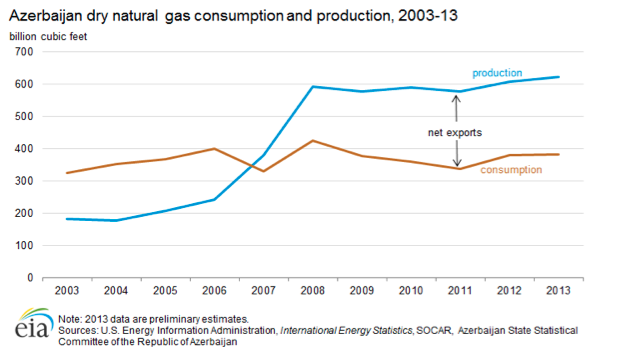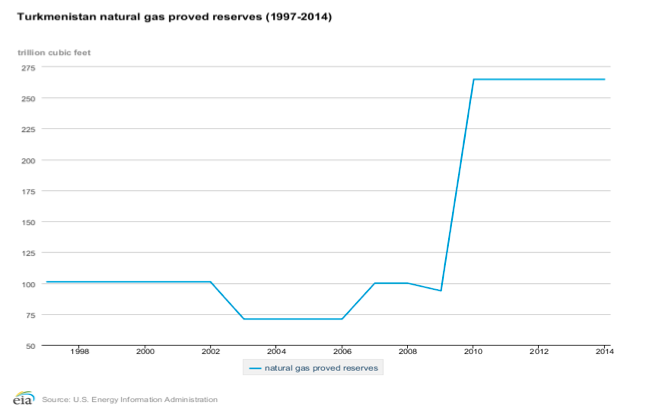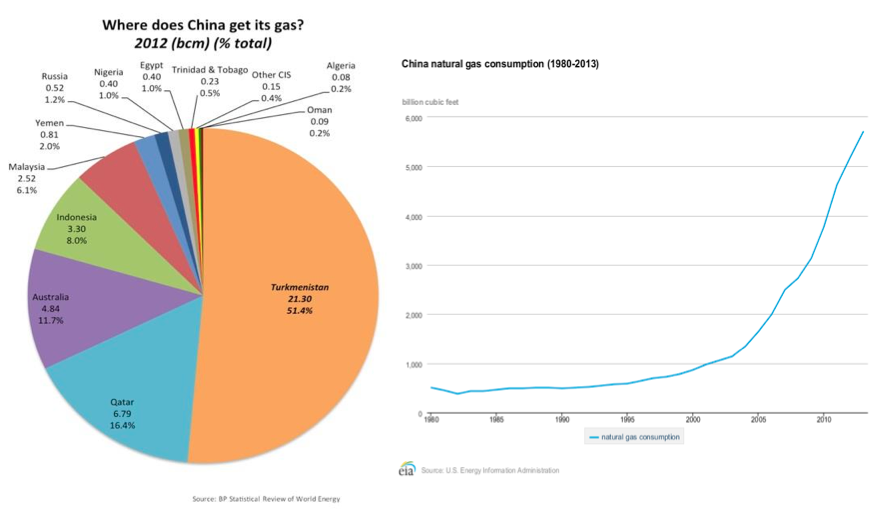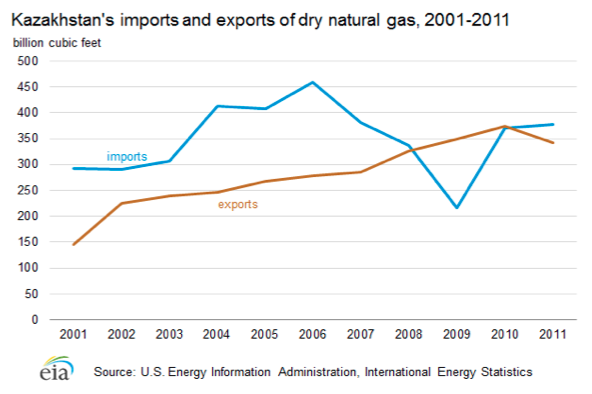Caspian Sea Littoral States’ Perspectives on the Southern Gas Corridor, EU Cooperation and Chinese Dominance
The Caspian Basin was, and still is, one of the most important reservoirs of oil and gas in the world - the second largest in the world after the Persian Gulf. It is close to a number of important consumer countries in Eurasia, but on the other hand it lacks open-sea access to world markets. The Caspian contains large volumes of oil and natural gas reserves, in offshore deposits and in onshore fields in the immediate region. It is estimated that it contains 48 billion barrels of oil and 8.7 tcm of gas in proven or probable reserves.[1] A recent trend to strengthen the position of exporters by arranging long-term relationships with neighboring consumers (especially China) and by looking for new markets (e.g. the European Union) was seen among the region’s energy suppliers. There is, as a consequence, a huge difference between regional cooperation and potential competition in Caspian energy sector.[2]
The recent standoff in Ukraine and freezing of negotiations on South Stream with Russia earlier this year, increased the importance of the Southern Gas Corridor for the EU. Negotiations between the EU, Azerbaijan and Turkmenistan intensified in September 2011. In July 2013, after high-level talks in Ashgabat, a framework agreement was signed between the governments of Turkmenistan and Turkey on cooperation in deliveries of Turkmen gas to Turkey and to Europe. Later on, in April 2014, the President of Turkmenistan, Gurbanguly Berdimuhamedov, met with the head of the State Oil Company of Azerbaijan (SOCAR), Rovnag Abdullayev and agreed to build transit pipelines, which will allow for a diversification of gas supplies in both countries, and assist transit to international markets. The Trans-Caspian gas pipeline (TCP) project, envisaging the construction of a 300-kilometer gas pipeline across the Caspian Sea to the shores of Azerbaijan, was considered optimal for the delivery of Turkmen energy resources to the European market.
However, the positions of the third parties and their arguments were also well known. Russia and Iran strictly oppose the construction of a TCP, stressing that the project cannot be implemented without first resolving the issue of the international legal status of the Caspian Sea. Moscow in particular, was jealous of such a union of former Soviet republics, which it perceive as undermining the hegemony of the Russian gas market. Russia, ignoring the economic importance of the project to Turkmenistan and Azerbaijan, continues to argue that it is a Western interference in the affairs of the region. In turn, Baku and Ashgabat rejected the objections of Russia and Iran, pointing out that the project affects the interests of only two littoral states, and hence can be implemented on a bilateral basis. The EU also, does not consider the absence of a decision on the status of the Caspian Sea an obstacle to the implementation of the project.[3]
The results of the last meeting of the Foreign Ministers of the Caspian Sea littoral states on April 22th 2014 in Moscow, where the main purpose was to resolve Caspian division issues, leave no doubt that Russia, at the upcoming summit in Astrakhan on September 29th 2014, will still seek to push the heads of the Caspian Sea countries to limit Western influence in the region. But nevertheless, there is a hope that during the upcoming summit some positive steps will be made towards defining the legal status of the Caspian Sea and intergovernmental energy cooperation.[4]
A key role in the implementation of the TCP Western countries assign to Turkmenistan. In an interview, the Minister of Industry and Energy of Azerbaijan Natig Aliyev told reporters that the Turkmen side was ready to provide for this project about 30 bcm of gas annually, and Azerbaijan was ready to create all necessary conditions and infrastructure for the further transportation of these volumes to European countries.
However, Ashgabat is in no hurry to start laying the pipe, preferring to receive the payment for its delivered gas on the state border and leaving all other questions to the buyers. But, for those doubting the environmental risks of the project the government of Turkmenistan repeatedly expressed its readiness to conduct an environmental impact assessment, with the participation of international experts, thereby confirming its openness for further dialogue.[5]
Azerbaijan:
In his interview to the London based news agency The Report Company in the end of 2013, the Minister of Industry and Energy of Azerbaijan, Natig Aliyev, stated that one of the main areas of the cooperation between Azerbaijan and the EU was the dialogue on energy. The Memorandum of Understanding on Cooperation in the Field of Energy between the European Union and Azerbaijan, which was signed on 7th November 2006, provided new opportunities for broadening of this dialogue. The major objectives of this MoU included the diversification and security of the EU’s energy supply as well as the development and modernization of Azerbaijan’s energy infrastructure. According to the Minister, new opportunities were created for a more intensive cooperation in a number of areas in the energy sector after the adoption of the EU Eastern Partnership Program by Azerbaijan in May 2009. A sign of the positive development of such relations was the high-level visit of the President of the European Commission José Manuel Barroso to Azerbaijan in January of 2011. The Joint Declaration on the Southern Gas Corridor was signed during that visit, confirming yet again that energy was a priority area for both parties.[6]
Mr. Aliyev also mentioned that today, Azerbaijan was renowned throughout the world as one of the leading oil exporters. He added that the oil and gas sector had created great opportunities for them to establish strategic relationships at a global level, and to create and broaden new collaborative initiatives.
“Most importantly, oil and gas has meant that our country has become an authority in the world arena. It is impossible to imagine the energy map of our region and Europe without Azerbaijan. The implementation of the TANAP project following the Baku-Tbilisi-Ceyhan (BTC) main oil export pipeline and the Baku-Tbilisi-Erzurum main gas export pipeline, which are of particular importance among the seven oil and gas pipelines of our republic, made a significant contribution to energy security. The fact that today Azerbaijan has become a gas exporter strengthens the image of our republic and has turned our country into a major player.”, he stated.

“The Shah Deniz gas field has very strong influence on energy security in the region. This is a global project. The export of Azerbaijani gas produced from the Shah Deniz gas field via the BTC pipeline started in the first quarter of 2007. The Shah Deniz gas field has 1.2 tcm of confirmed gas reserves. The Trans Adriatic Pipeline (TAP) project was selected by the Shah Deniz consortium. This project provides for the transportation of Azerbaijani gas from the Caspian region via Greece and Albania to the south of Italy via the Adriatic Sea and finally to Western Europe. The project is a good choice in terms of its profitability, safety, efficiency and commercial aspects. We intend to carry on building intensive partnerships with key exporting countries against the backdrop of increased global competition. Azerbaijan is assuming an ever-greater importance in terms of European countries’ energy security, and has gained an image as a reliable partner who uses its energy resources for the creation of long-term relationships.”, Mr. Aliyev stressed in his interview to the news agency.
Returning to the foreign energy diplomacy of Azerbaijan towards the EU, one should note the statement of the Minister of Foreign Affairs of Azerbaijan, Elmar Mammadyarov, at the 5th Foreign Ministers’ meeting of EU Member States and Eastern Partnership countries on July 22nd 2014 in Brussels.[7] He emphasized that Azerbaijan was a reliable partner for the EU in the energy sector, delivering its natural gas on a large scale and at a competitive price. Mr. Mammadyarov also stressed his country's efforts in creating a potential gas transportation infrastructure as part of the process of connecting the Caspian region and Europe.
Azerbaijan’s plan is to increase the volume of gas production up to 28.8 bcm by the end of this year. Moreover, the proven gas reserves of SOCAR on January 1st 2014 were 61.15 bcm compared to only 23.82 bcm at the end of 2012, according to SOCAR’s report on the sustainable development of the results of 2013, published on the official website of the company. In particular, SOCAR launched a new well within Guneshli field in the Azerbaijani sector of the Caspian Sea with a daily production rate of 85 tons of oil and 16 thousand cubic meters of gas. The company plans to drill another 20 new wells in this field. It is clear that Azerbaijan has much to offer to its European partners and potential customers, especially in terms of gas supplies.[8]
Turkmenistan:
The Turkmen gas field Galkynysh, recognized as the world's second largest, could easily become a resource base for this ambitious project. President Gurbanguly Berdimuhamedov promised to start its development this year. South Korean and Chinese companies have already started building there three gas refineries. The capacity of each will be around 10 bcm of gas per year.[9] In addition, in accordance with the Program of the Oil and Gas Industry, Turkmenistan plans to increase annual natural gas production to 250 bcm until 2030, much of which is destined for export.[10]
"Turkmenistan will continue to actively participate in the development of mutually balanced solutions to all issues related to the Caspian Sea", the President said at the weekly cabinet meeting in Ashgabat on April 14th 2014.[11] The statement was made ahead of the upcoming summit of heads of Caspian Sea littoral states (Russia, Azerbaijan, Kazakhstan, Turkmenistan and Iran), to be held this September in Astrakhan, Russia. But due to outstanding and fundamentally different points of view on the issue it is unlikely that convention on the legal status of the Caspian Sea will be signed.
However, at a special meeting of the country’s oil and gas sector earlier this year, President Berdimuhamedov called the TCP project as one of the most important tasks for the country’s energy diversification.

A week earlier, on April 2nd 2014, the topic was also discussed in Baku, the capital of Azerbaijan, during the visit of Minister of Foreign Affairs of Turkmenistan, Rashid Meredov, with his Azerbaijani counterpart Elmar Mammadyarov. The ministers of the two Caspian countries expressed their interest in the use of alternative routes for supplying energy resources of the Caspian region to Europe.[12]
Later on the 1st Trilateral Meeting of the Ministers of Foreign Affairs of Turkey, Azerbaijan and Turkmenistan was held again in Baku, on May 26th 2014, where “big brother” Turkey seemed to assume the role of key negotiator, motivator and catalyst for the Southern Gas Corridor development. At the end of the meeting the Foreign Ministers also announced their decision to hold the 2nd Trilateral Meeting of the Ministers of Foreign Affairs of Turkey, Azerbaijan and Turkmenistan in the second half of 2014 in Ashgabat.[13] This important step is a positive sign and can give an impetus for the rapid implementation of all projects in the Southern Gas Corridor chain. In all endeavors the first step is always the most difficult and the most important, and the natural gas market is no exception.
Moreover, Turkmenistan is taking particular interest in the development of constructive cooperation with the countries of Central and Eastern Europe. On July 2nd 2014, Ashgabat hosted a meeting of the Joint Turkmen-Bulgarian Intergovernmental Commission on Economic Cooperation. The Bulgarian delegation was headed by the Minister of Economy and Energy Dragomir Stoynov. During the event, the parties identified the energy sector, construction and trade as the most promising areas of cooperation. They also exchanged views on issues of mutual protection of investments, taxation, international cargo, passenger transportation, etc.[14] Another significant step towards European cooperation and energy partnership, especially with Eastern Europe, was the official visit of President of Slovenia Borut Pahor to Turkmenistan on 22nd-23rd July 2014. After the meeting with his counterpart, Gurbanguly Berdimuhamedov, the two presidents stated their readiness to cooperate in ensuring global energy security. All this shows the interest of Ashgabat to expand opportunities for the supply of its hydrocarbon resources abroad, especially towards Europe, although it still largely conducts a cautious and restrained position on key foreign policies, and foreign partners.[15]
Nevertheless, relations between Baku and Ashgabat are not always smooth and the legal status of the Caspian Sea is not the only obstacle to the realization of TCP project. Another stumbling block to the project is an unresolved, long-standing dispute between Ashgabat and Baku over the exploitation of Kapaz field, referred to as Serdar by the Turkmen side. Experts estimate that the Kapaz field could hold about 50 million tons of oil and more than 30 bcm of gas. Baku offered Ashgabat to develop the field jointly, but Turkmenistan has not replied to this proposal conclusively. In June 2012, the dispute led to a diplomatic row between the two countries, after Azerbaijan began working in the area where the field is located. The question still remains a bone of contention between the two littoral states.[16]
Chinese dominance in Turkmen oil and gas sector:
The biggest competitor to the EU in Turkmenistan is not Russia anymore, it is China. Turkmenistan is rich in energy resources, whilst China has a huge market and the two countries have great economic complementarity and are determined to cooperate. The rich gas resources of Turkmenistan contribute to China's goal of diversifying energy imports and ensuring energy security.
Turkmenistan has become an important partner of China in the field of gas cooperation. This was stated in an interview with the news agency Xinhua by the Deputy Director-General of China Petroleum Joint Stock Company PetroChina, Lu Gunsyun.[17] According to him, in accordance with the agreement signed by the Chinese President Xi Jinping during his visit to Turkmenistan in 2013, the annual volume of natural gas supplied by Turkmenistan to China will increase from 40 bcm in 2014 to 65 bcm in 2020 (after gas from the Galkynysh field will start flowing), the fourth branch (D) of the pipeline through Uzbekistan, Tajikistan and Kyrgyzstan is being built for that purpose. According to the Deputy Director-General, with the deepening of the strategic partnership between the two countries, their gas cooperation will be further strengthened and will become an inexhaustible impetus for improving inter-state relations.[18]
Turkmenistan is now, by a great margin, China’s largest foreign supplier of natural gas: over 21.3 bcm in 2012 or 51.4 percent of imports, according to data published by the BP Statistical Review of World Energy. That’s about three times more than Qatari supplies to China (see chart on page 6).[19] Based on the latest figures, updated this April, Turkmenistan has already delivered 78.3 bcm of gas to China so far. By the end of this year, gas deliveries from Ashgabat to Beijing will total around 30 bcm, or about one-sixth of China's annual requirements.
It is no wonder, that after the visit of Chinese President to Turkmenistan in 2013, gas cooperation between the two countries increased to a higher level. Moreover, the recent visit of the Vice-Premier of the State Council of China Zhang Gaoli to Turkmenistan on August 28th 2014 further promoted the implementation of various contracts and agreements between the governments and enterprises of the two countries and the preparation of new joint projects in the oil and gas sector. Furthermore, it stimulated the realization of President Xi Jinping’s initiatives to build the Silk Road Economic Belt and a 21st-century maritime Silk Road.[20]
Sign of hope for the EU:
But, nevertheless, there is reason to believe that Ashgabat, in the light of the agreements in mid-May 2014 between Moscow and Beijing on Russian gas supplies to China in the amount of about 40 bcm per year [21], can rearrange its position and take a political decision in favor of the Trans-Caspian gas pipeline. Russia's emergence in the Chinese energy market may create competition to Turkmen gas, that can result in significant financial losses for Turkmenistan. Beijing’s policy of diversifying energy sources, obviously, may lead it to seek a revision of gas prices with the current gas suppliers - Turkmenistan, Uzbekistan and Kazakhstan. In this case, the Turkmenistan’s interest to supply its gas to Europe will probably increase, and the TCP will gain much more relevance for Ashgabat than it has been the case so far.

Kazakhstan:
Kazakhstan can become an important supplier of hydrocarbons to the EU. But despite its participation in the Customs Union with Russia, it still pays Russia excessive rates of transit. Moreover, it has no direct access to European markets and depends on transit countries. But, even if it is still a member of the Moscow-led Customs Union and the Eurasian Economic Union, Kazakhstan has extended its partnership with the energy hungry EU. This was confirmed during the 7th round of negotiations between Kazakhstan and European Union on a new enhanced Partnership and Cooperation Agreement, which was held on June 30th-July 1st 2014 in Brussels.[22] A new agreement has not yet been agreed, but following political, economic and humanitarian cooperation, the EU is now seeking energy cooperation with energy rich Kazakhstan. Only last year the EU - Kazakhstan trade turnover amounted to 53.4 billion USD.[23] Based on the new agreement, trade could also increase. At the Brussels meeting, the parties agreed to hold the final round of negotiations in Astana in October 2014, with the aim of initializing the draft agreement at the political level by the end of this year.
Kazakhstan is also seeking to diversify its oil supplies. In late 2013, Kazakhstan adopted a decision on the transportation of hydrocarbon resources through the Caspian Sea in total amount of 4 million tons of oil, 3 million tons of which were to be transported via the Baku-Tbilisi-Ceyhan (BTC) and 1 million tons by the railway to the Georgian Kulevi terminal on the Black Sea. The decision was confirmed on May 15th 2014 by Kazakhstan’s Minister of Oil and Gas Uzakbai Karabalin, who said that his country expected to transit 3 million tons of oil pumped from the Tengiz field via the BTC in 2014.[24]

Conclusion:
In summary, at a time when control over the transit corridors of oil and gas from the Caspian Sea to Europe is becoming extremely important, the probability that the littoral states will focus on strengthening energy cooperation with the EU is relatively high. This will play a crucial role in strengthening their own energy independency and diversification. But, it is not only the Caspian littoral states that should be involved in the process. The significant support and solidarity of the EU is crucial in order to resolve all outstanding obstacles to the project.
As a result of Trilateral Turkish-Azerbaijani-Turkmen high-level consultations, in the near future one can expect an intensification of the dialogue between the EU and Turkmenistan on the implementation of the Trans-Caspian gas pipeline. Experts suggest that once all political and economic differences between Turkmenistan and Azerbaijan are solved, the project to build a gas pipeline under the Caspian Sea could become a reality.
On the other hand, it is hard to expect any major breakthrough during the upcoming 4th Summit of the Caspian littoral states, which will be held this September in Astrakhan. Formally, the convention on the legal status of the Caspian Sea is almost ready, but there are very serious contradictions. Azerbaijan, Turkmenistan and Iran have different views on their territorial share of the Caspian Sea, and Russia is likely to seek a decision by the heads of the Caspian Sea countries in favor of limiting Western influence in the region. Yet if the heads of the Caspian Sea littoral states will in some contexts see eye to eye on the abovementioned provisions, it can be the basis for creating an atmosphere of stability and good neighborly relations, which in turn will guarantee the future development of intergovernmental energy cooperation among the Caspian states.
Eldar Latypov
[1] For more information visit: http://www.stratfor.com/video/strategic-importance-caspian-sea#axzz3CiGyJDB3
[3] For more information visit: http://ccee.ada.edu.az/files/articles/1143/CCEE_Policy_Brief_October_23_2013_Jackson.pdf
[6] For the full interview visit : http://www.the-report.net/azerbaijan/oct2013/674-interview-natig-aliyev-minister-of-industry-and-energy
[7] For the full statement visit : http://www.azembassy.be/?options=news&id=11&news_id=14
[8] For the full SOCAR report visit (only in Azeri): http://new.socar.az/socar/assets/documents/az/socar-annual-reports/davamli-inkisaf2013.pdf
[10] For more details visit (only in Russian): http://www.oilgas.gov.tm/novosti
[11] For more details visit : http://en.trend.az/casia/turkmenistan/2262348.html
[12] For more information visit : http://en.trend.az/azerbaijan/2258203.html
[13] For more details visit : http://www.mfa.gov.tr/first-trilateral-meeting-of-the-foreign-ministers-of-turkey_-azerbaijan-and-turkmenistan-held-in-baku.en.mfa
[14] For more details visit : http://turkmenistan.gov.tm/_eng/?id=3744
[15] For more important information visit : http://turkmenistan.gov.tm/_eng/?id=3802 and http://www.up-rs.si/up-rs/uprs-eng.nsf/pages/87FBE6A57110458CC1257D40002E631C?OpenDocument
[17] See also: http://rusmininfo.com/news/01-09-2014/china-and-turkmenistan-intend-develop-gas-cooperation
[18] For more details visit : http://english.cntv.cn/program/newshour/20130904/102927.shtml
[19] See also : http://www.eurasianet.org/node/67356
[20] For the full official report visit : http://news.xinhuanet.com/english/china/2014-08/28/c_133594978.htm
[22] For more details visit http://en.tengrinews.kz/politics_sub/Kazakhstan-and-EU-negotiate-new-Partnership-and-Cooperation-Agreement-254598/
[23] For the detailed EU-Kazakhstan trade numbers look at : http://trade.ec.europa.eu/doclib/docs/2006/september/tradoc_113406.pdf


